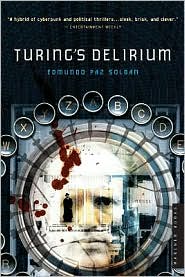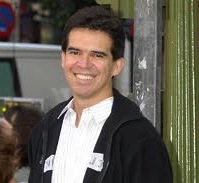“If the program that runs the universe were mathematical, there would be a primary algorithm from which the rest would be derived. If the program were computational, there would be three or four lines of code that could explain the tides and the leopard’s spots and the wide variety of languages and the movements of your right hand…[Eventually], you ponder the question and ask yourself, ‘What is the meaning of wondering about meaning?'”
Dense with ideas and complex in its plots, Turing’s Delirium confronts the issues of globalization and the conflicts generated by a perpetual underclass. Within a thriller set in Rio Fugitivo, Bolivia, author Edmundo Paz Soldan, described by Mario Vargas Llosa as “one of the most important Latin American writers of the new generation,” brings social unrest to life in this Third World country. Though young intellectuals have always relied on strikes, demonstrations, and indigenous riots by miners, coca growers, and other laborers to emphasize  their grievances—and do so in this novel, too—they now have a new weapon, the computer. Now it is possible for the resistance and revolution to be conducted in cyberspace, and hackers are the front line in the waging of the new war.
their grievances—and do so in this novel, too—they now have a new weapon, the computer. Now it is possible for the resistance and revolution to be conducted in cyberspace, and hackers are the front line in the waging of the new war.
Several plot lines develop simultaneously here: The main character, Miguel Saenz, also known as Turing, was nationally famous in the 1970s as a code-breaker, but he is now in charge of the archives of the Black Chamber, the Bolivian security agency. He has recently received a coded message which was hacked into his own computer, “Murderer, your hands are stained with blood.”
Turing now works for Ramirez-Graham, an American-born Bolivian recruited by the vice-president of Bolivia to modernize the Black Chamber. The President of Bolivia, Montenegro, a former dictator, has recently been democratically elected, but he is in trouble politically. Tremendous unrest has resulted from the President’s decision to give the national contract for electricity to Globalux, an Italian and American consortium, which has raised prices and angered the general population.

The chief hacker into the governments systems is Kandinsky, a young expert in creating viruses. Like many of the young people involved in the resistance, Kandinsky participates in the virtual “game” of Playground, in which young hackers try out techniques for conquering the enemy, recruit others who share their ideas, and try on other identities, always careful to keep their real identities secret. The fact that virtual reality is “virtually” identical to “real” reality is one of the keystones of the novel.
As the various characters are developed and their backgrounds and relationships are shared with the reader, the several plot lines begin to swirl together and become increasingly complex. Simultaneously, the author also explores more complex metaphysical ideas–the nature of reality as opposed to virtual reality, the mechanisms of thought, concepts governing identity, and guiding principles of the universe.
Stylistically, Paz Soldan is a magician, keeping at least three or four different plot lines going at the same time, developing characters and their relationships, and exploring philosophical ideas. Turing, for whom the author uses the second person point of view to reveal thoughts, proves to be a different character depending on who is considering him, and whether or not he is a reliable focus for the novel is always an open question for the reader. As murders mount in number, questions arise about all the main characters – is Kandinsky a “good” person or not, are Turing’s motives “pure,” is Judge Cardona an avenging angel or a vengeful criminal, and can the problems of the country ever be solved? The novel is dense and philosophical, but Paz Soldan provides a vibrant picture of life in Rio Fugitivo.
Notes: An acclaimed member of the McOndo Movement, which is Latin America’s pragmatic answer to the magic realists, Edmundo Paz Soldan raises questions about the universal meaning of “progress” and its particular meaning in places like Rio Fugitivo.
Also reviewed here: Paz Soldan’s A MATTER OF DESIRE and NORTE
The author’s photo appears on his publisher’s website: http://www.houghtonmifflinbooks.com
